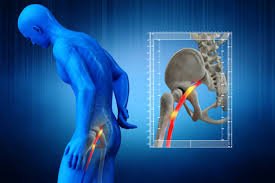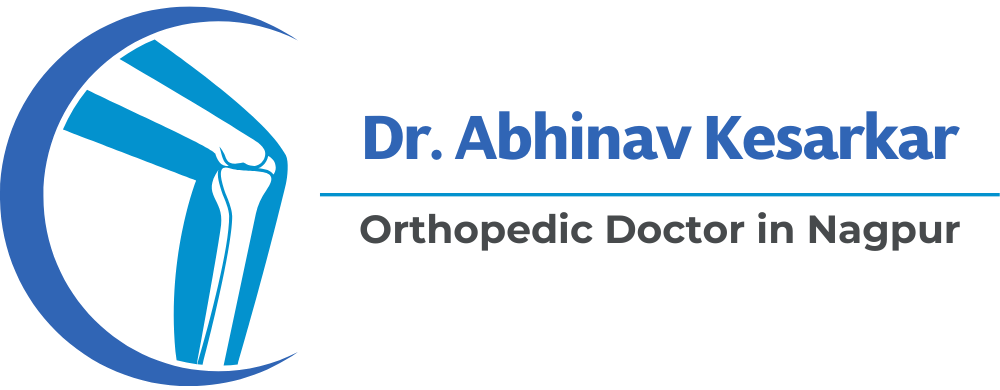Complex fracture treatment in Harda

Complex fracture treatment in Harda – Kesarkar Hospital
A fracture can disrupt life instantly, but a complex fracture is far more severe and demanding. It not only breaks the bone but can also damage muscles, blood vessels, and surrounding tissues. Therefore, such cases require specialized orthopedic care to ensure proper healing and full functional recovery.
If you are searching for advanced complex fracture treatment in Harda, Dr. Abhinav Kesarkar is among the most trusted and experienced orthopedic specialists in the region. With years of expertise in trauma surgery, joint reconstruction, and bone restoration, he provides individualized, evidence-based treatment to help patients regain strength, stability, and mobility.
What Is a Complex Fracture?
A complex fracture, also known as a comminuted or compound fracture, is a severe break in which the bone shatters into multiple fragments or protrudes through the skin. This type of fracture is often caused by high-energy trauma such as road accidents, falls from height, industrial injuries, or sports collisions.
Unlike a simple fracture, which can sometimes heal with casting or splinting, a complex fracture requires advanced orthopedic intervention to properly realign and stabilize the bone. Therefore, timely treatment by an experienced specialist like Dr. Abhinav Kesarkar is crucial for ensuring optimal recovery and preventing long-term complications.
Common Causes of Complex Fractures
Complex fractures can result from various situations, such as:
High-impact accidents – Motorbike or car crashes often cause multiple bone breaks.
Severe falls – Falling from stairs, ladders, or elevated surfaces.
Industrial injuries – Accidents involving heavy machinery or construction sites.
Sports trauma – Football, cricket, or gym-related injuries can sometimes lead to multiple bone fractures.
Bone diseases – Conditions like osteoporosis or bone infections make bones fragile and prone to complex breaks.
Each of these situations requires careful assessment and specialized management because the injury may involve not only bone but also nearby muscles, tendons, nerves, or blood vessels.
Symptoms of a Complex Fracture
The symptoms of a complex fracture are typically severe and easily recognizable. However, early medical attention makes a significant difference in recovery. Common symptoms include:
Severe, sharp pain that increases with movement.
Visible deformity or misalignment of the limb.
Swelling, bruising, and warmth around the affected area.
Bleeding or open wounds, especially in compound fractures.
Loss of mobility or inability to bear weight.
Numbness or tingling, indicating possible nerve injury.
If any of these symptoms appear, it’s important to visit an orthopedic emergency center immediately. Delaying care may lead to improper healing, permanent deformity, or infection.
Diagnosis and Evaluation
Before planning treatment, an accurate diagnosis is essential. Dr. Abhinav Kesarkar performs a thorough evaluation to determine the type, location, and severity of the fracture.
Diagnostic Methods:
Physical examination to check alignment, swelling, and sensation.
X-rays to confirm the fracture pattern and position.
CT scans for detailed imaging of complex or joint-involving fractures.
MRI scans to identify soft tissue, ligament, or nerve injuries.
Lab tests if infection or bone disease is suspected.
Moreover, every patient receives a personalized consultation, where Dr. Kesarkar explains the findings, discusses possible treatment options, and provides a realistic timeline for recovery.
Advanced Treatment Options at Dr. Abhinav Kesarkar’s Clinic
Complex fractures demand expert surgical precision and advanced rehabilitation care. Dr. Abhinav Kesarkar offers a complete range of modern treatment solutions designed to achieve proper alignment, faster healing, and full mobility restoration.
1. Non-Surgical Management
In some stable cases, if the bone fragments are well-aligned, non-surgical methods like casting or bracing may be sufficient. However, these cases are rare in complex fractures. Regular monitoring is essential to ensure that the bone heals in the correct position.
2. Open Reduction and Internal Fixation (ORIF)
This is the most commonly performed surgery for complex fractures.
The surgeon realigns the bone fragments precisely.
Plates, screws, or rods are used to hold them securely.
This provides strong internal stability, enabling early movement.
Because of Dr. Kesarkar’s surgical expertise, patients experience reduced complications, minimal scarring, and quicker return to normal activity.
3. External Fixation
When soft tissues are too swollen or damaged, temporary external frames or rods are applied to stabilize the bone. Once swelling subsides, definitive surgery is performed. This staged approach prevents infection and ensures safe healing.
4. Bone Grafting and Reconstruction
Sometimes, bone fragments are missing or severely damaged. In such cases, bone grafting—using the patient’s own bone or synthetic substitutes—is done to fill gaps and stimulate healing. This advanced procedure helps restore the natural shape and strength of the bone.
5. Minimally Invasive Techniques
Dr. Kesarkar also uses keyhole surgical methods for certain fractures, minimizing tissue damage and promoting faster recovery. These techniques are particularly useful in joint-related or smaller bone fractures.
Post-Surgery Rehabilitation and Physiotherapy
Recovery after a complex fracture doesn’t end with surgery — it continues through structured rehabilitation.
Under Dr. Kesarkar’s supervision, every patient receives a customized physiotherapy plan focusing on:
Early motion exercises to prevent stiffness.
Gradual strengthening of muscles and joints.
Gait training and posture correction.
Nutritional advice for bone health.
Moreover, regular follow-up appointments help track healing progress and make timely adjustments. As a result, patients regain strength and confidence faster than expected.
Why Choose Dr. Abhinav Kesarkar for Complex Fracture Treatment in Harda?
There are many reasons why patients across Harda, Hoshangabad, and surrounding areas trust Dr. Abhinav Kesarkar for fracture and trauma care:
🩺 Highly Qualified Orthopedic Surgeon: Specialized training in trauma and reconstructive surgery.
🧠 Accurate Diagnosis: Supported by modern X-ray, CT, and MRI imaging facilities.
⚙️ Advanced Surgical Expertise: Experience in handling severe, multi-fragmented, and open fractures.
❤️ Patient-Centered Approach: Every treatment is explained clearly, and patients are guided through every stage.
🔬 Modern Infrastructure: Equipped with latest tools, operation theaters, and sterilization systems.
💬 Comprehensive Aftercare: Includes physiotherapy, counseling, and home care guidance.
In addition, Dr. Kesarkar’s philosophy is rooted in compassion and education. He believes that a well-informed patient heals faster — therefore, each consultation includes detailed explanations and emotional support.
Risks of Ignoring a Complex Fracture
Leaving a complex fracture untreated or inadequately treated can lead to:
Bone malunion (improper healing).
Non-union (failure of bone to heal).
Chronic pain or stiffness.
Infection in open fractures.
Permanent disability or deformity.
However, with early intervention by an experienced orthopedic doctor, these complications can be effectively avoided.
Emotional and Mental Support During Recovery
Recovering from a complex fracture is not only a physical journey but also an emotional one. Patients often experience frustration or fear during prolonged rehabilitation. Dr. Kesarkar’s team provides holistic care, including mental health support and motivation.
Family members are also guided on how to assist the patient at home — ensuring safety, comfort, and encouragement throughout recovery.
When to See a Sciatica Specialist
You should consult an expert immediately if you notice:
Persistent pain radiating from your back to your leg.
Numbness or tingling sensation lasting for several days.
Difficulty in walking or bending.
Pain disrupting your sleep or daily activities.
Loss of bladder or bowel control (a medical emergency).
Early diagnosis not only prevents permanent nerve damage but also allows you to recover faster with simpler treatment options.
Book your appointment with Dr. Kesarkar
Regain your pain-free life and active mobility today. Book your appointment with Dr. Kesarkar, Best Hip Replacement Doctor in Nagpur, for expert consultation and advanced treatment options.Contact Now

